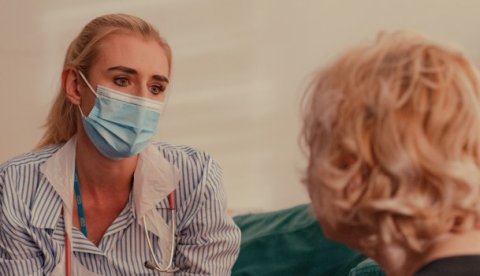Diagnostic radiographer
Diagnostic radiographers use state-of-the-art technology to diagnose patients and make sure they receive the right treatment to help them on their road to recovery.
What's it like to be a diagnostic radiographer?
Radiography is one of the most innovative aspects of healthcare – you’ll use advanced technology to look inside patients’ bodies and understand the root causes of their illness, and consult with colleagues on diagnosis and treatment plans.
About the job
What does a diagnostic radiographer do?
As a diagnostic radiographer, you’ll use cutting-edge technology to take images of the insides of patients to help understand and diagnose conditions.
Based in a hospital, you’ll work with patients and colleagues to design treatment programmes and support patients throughout their treatment. From using a CT scanner to make a 3D image for a surgeon, to preparing a patient for an MRI scan – you’ll be using some of the most complex and advanced technology.
Diagnostic radiographers are also an important part of the multi-disciplinary team, working with other healthcare professionals across various departments.
What are the pay and conditions like?
Your standard working week will be around 37.5 hours and may include a mix of shifts, such as nights, early starts, evenings, and weekends. If you work in the NHS, you’ll be paid on the Agenda for Change (AFC) pay system, typically starting on band 5.
You will be able to claim £2,000 a year towards childcare costs through the NHS Learning Support Fund, and there’s funding available for adult dependants and some placement travel costs too. If you have a disability, there are grants to help with essential costs while studying via the Disabled Students’ Allowance.
If working on the NHS you will have access to one of the best pension schemes in the UK, as well as access to exclusive health service discounts and benefits at some of the most popular brands.
Where you could be working
What are your career development opportunities?
You’ll receive an annual personal development review to ensure you’re making the most of every opportunity offered. And with continuous professional development, you can add to your skills and progress to specialist roles with a higher pay grade.
You’ll be encouraged to join the Society of Radiography where you can take courses, conferences, and seminars.
As your career progresses, you could specialise in a particular type of imaging, such as computerised tomography scanning or sonography. Or you could specialise in working with children, stroke patients or cancer patients, for example. Research or teaching are other options.
Working for the NHS, you may also find yourself heading your own radiography team, managing budgets, staff, and equipment.
We are the NHS - we are one team
Is it for you?
Are you a good communicator?
Are you interested in new technologies?
Are you a team player?
Are you adaptable?
How to apply
Applying with a degree
To become a diagnostic radiographer, you must first successfully complete an approved degree or master's in radiotherapy. Degree courses take three or four years full-time, or up to six years part-time. There are also some postgraduate programmes that can take two years.
Once you’ve completed your degree, you need to register with the Health and Care Professions Council (HCPC) before you can start practising.
Entry requirements for an undergraduate degree include:
- two or three A levels, including physics, chemistry or biology/human biology
- five GCSEs (grades A – C), including English language, maths, and science
Or the equivalent qualifications:
- a BTEC, HND or HNC, including science
- a relevant NVQ
- a science-based access course
- equivalent Scottish or Irish qualifications
Applying with a degree apprenticeship
A degree apprenticeship is another way to become a diagnostic radiographer. Apprenticeships give you the chance to earn a living while gaining your qualification.
To get onto a degree apprenticeship, you will need to apply for an apprentice position with a health care provider. You can search for vacancies on the NHS Jobs website and Find an Apprenticeship website.
Once you’ve successfully completed a programme approved by the HCPC, you are then eligible to apply for registration with them. Once registered as a practitioner, you’ll be required to retain your name on the register by keeping your knowledge and skills up-to-date and paying an annual retention fee.
Your employer and the government will pay the tuition fees, so apprenticeships aren’t eligible for student grants.

Find out more
Sign up for free, expert advice on starting a diagnostic radiographer careerOther careers in allied medicine
-
As the first responders to medical emergency situations, paramedics head into the unknown to save lives and help those in need of urgent medical care.
-
Occupational therapists empower people to overcome the difficulties they face with living independently. They improve the quality of life for people living with disabilities, illnesses, traumas, ageing, and long-term conditions.
-
Physiotherapists help people regain their independence by relieving physical difficulties and improving mobility with exercise and other techniques
-
Podiatrists help people live more comfortably by providing treatment and care for foot and leg problems.
-
Prosthetists and orthotists use the latest technology to transform the lives of patients who need prosthetics or aids. They empower people to move, run, walk or simply stand independently.
-
Speech and language therapists play a crucial role in enabling people to communicate – enhancing people's lives and transforming their relationships.
-
Therapeutic radiographers play a crucial part in fighting cancer and supporting patients on their road to recovery.
-
You’ll help improve the quality of people’s lives by treating eye disorders and spotting serious neurological conditions
Start your search now
Get your UCAS Hub
Your place to discover your options and research your future.
Sign up today